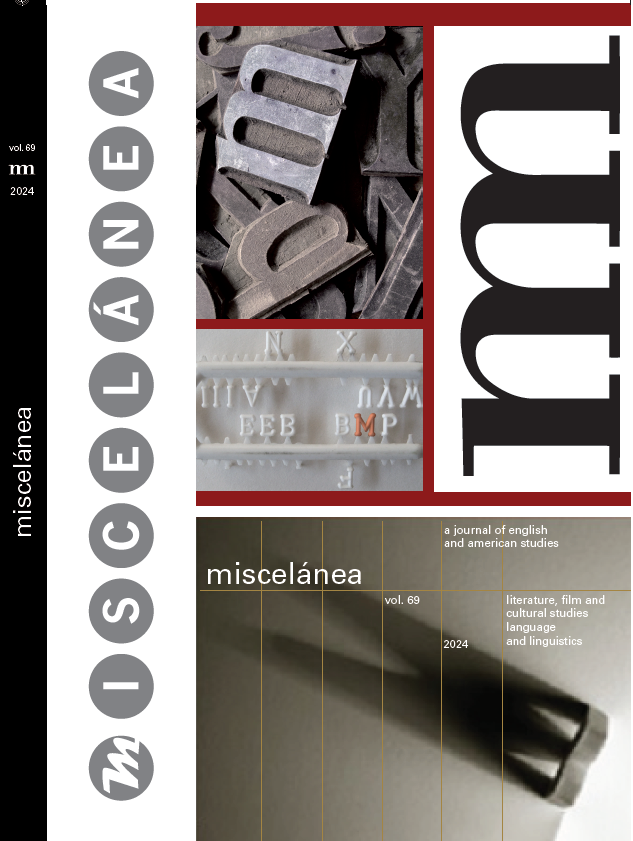Cambio de posición del acento en parejas de conversión nombre-verbo: El caso de parejas como ImportN-ImportV
DOI:
https://doi.org/10.26754/ojs_misc/mj.20249843Palabras clave:
alomorfia, conversión, paradigmas derivativos, asignación del acento (germánico/romance), cambio de posición del acentoResumen
La conversión es un proceso de formación de palabras caracterizado, entre otros aspectos, por la identidad formal entre la palabra original y la palabra resultante (bottle à to bottle). Sin embargo, hay unos cuantos casos de palabras relacionadas por conversión que desafían esta característica de identidad formal. Uno de estos casos son las parejas de conversión nombre-verbo como importN-importV, en las que ocurre un tipo de alomorfía fonológica en la base de la palabra: cambio de posición del acento. En tales casos, el cambio de posición del acento consiste en que los nombres tienden a acentuarse en la primera sílaba (importN /ˈɪmpɔːt/) mientras que los verbos se suelen acentuar en la última (importV /ɪmˈpɔːt/). Este estudio pretende determinar qué parejas de conversión nombre-verbo son las que presentan más habitualmente cambio de posición del acento y por qué este tipo de alomorfía ocurre. Para responder a estas preguntas, se recopiló un corpus de 157 parejas de conversión nombre-verbo provenientes de listas de frecuencia de nombres y verbos. De entre estas parejas, 25 presentaban cambio de posición del acento. Además, también se anotó la etimología y el año de incorporación al inglés de las 25 parejas con cambio de posición del acento. Se encontró que todas las parejas de conversión nombre-verbo con cambio de posición del acento son de origen romance. Asimismo, los resultados sugieren que el cambio de posición del acento en las parejas de conversión nombre-verbo puede deberse a la adaptación de dichas parejas al sistema de acentuación germánico una vez incorporadas al inglés del latín o el francés.
Descargas
Referencias
ANTONIOVÁ, Vesna. 2016. “Derivational Paradigm – Is There Any? A Contrastive Research”. SKASE Journal of Theoretical Linguistics 13 (2): 91-105. <http://www.skase.sk/Volumes/JTL32/pdf_doc/05.pdf>. Accessed October 21, 2023.
BAUER, Laurie. 1983. English Word-Formation. Cambridge: Cambridge U.P. <https://doi.org/10.1017/CBO9781139165846>.
BAUER, Laurie. 1997. “Derivational Paradigms”. In Booij, Geert E. and Jaap van Marle (eds.) Yearbook of Morphology 1996. Dordrecht: Springer: 243-256. <https://doi.org/10.1007/978-94-017-3718-0_13>.
BAUER, Laurie. 2019. “Notions of Paradigm and their Value in Word-Formation”. Word Structure 12 (2): 153-175. <https://doi.org/10.3366/word.2019.0144>.
BAUGH, Albert C. and Thomas CABLE. 2013. A History of the English Language. Oxford: Routledge.
BEECHER, Henry. 2004. Derivational Paradigm in Word Formation. <http://citeseerx.ist.psu.edu/viewdoc/download?doi=10.1.1.94.9071&rep=rep1&type=pdf>. Accessed October 21, 2023.
BOOIJ, Geert. (2005) 2007. The Grammar of Words: An Introduction to Linguistic Morphology. Oxford: Oxford U.P.
BONAMI, Olivier and Jana STRNADOVÁ. 2019. “Paradigm Structure and Predictability in Derivational Morphology”. Morphology 29 (2): 167-197. <https://doi.org/10.1007/s11525-018-9322-6>.
BOYÉ, Gilles and Gauvain SCHALCHLI. 2016. “The Status of Paradigm”. In Hippisley, Andrew and Gregory Stump (eds.) The Cambridge Handbook of Morphology. Cambridge: Cambridge U.P.: 206-234. <https://doi.org/10.1017/9781139814720.009>.
CARSTAIRS-MCCARTHY, Andrew. 2006. “Internal Modification”. In Brown, Keith (ed.) Encyclopedia of Language and Linguistics. Oxford: Elsevier: 752-755. <https://doi.org/10.1016/B0-08-044854-2/00116-4>.
DIRVEN, René. 1999. “Conversion as a Conceptual Metonymy of Event Schemata”. In Panther, Klaus-Uwe and Günter Radden (eds.) Metonymy in Language and Thought. Amsterdam: John Benjamins Publishing Company: 275-287. <https://doi.org/10.1075/hcp.4.16dir>.
DON, Jan. 2005. “On Conversion, Relisting and Zero-Derivation”. SKASE Journal of Theoretical Linguistics 2 (2): 2-16. <https://www.academia.edu/55653857/On_conversion_relisting_and_zero_derivation>. Accessed October 21, 2023.
EMBICK, David. 2012. “Contextual Conditions on Stem Alternations: Illustrations from the Spanish Conjugation”. In Franco, Irene, Sara Lusini and Andrés Saab (eds.) Romance Languages and Linguistic Theory 2010: Selected Papers from “Going Romance” Leiden 2010. Amsterdam: John Benjamins Publishing Company: 21-40. <https://doi.org/10.1075/rllt.4.02emb>.
FARRELL, Patrick. 2001. “Functional Shift as Category Underspecification”. English Language and Linguistics 5 (1): 109-130. <https://doi.org/10.1017/S1360674301000156>.
GAETA, Livio and Marco ANGSTER. 2019. “Stripping Paradigmatic Relations out of the Syntax”. Morphology 29 (2): 249-270. <https://doi.org/10.1007/s11525-018-9326-2>.
GIMSON, Alfred Charles. 1962. An Introduction to the Pronunciation of English. London: Edward Arnold LTD.
JESPERSEN, Otto. 1949. A Modern English Grammar on Historical Principles: Part 1, Sounds and Spellings. London: George Allen and Unwin.
KASTOVSKY, Dieter. 2006. “Typological Changes in Derivational Morphology”. In van Kemenade, Ans and Bettelou Los (eds.) The Handbook of the History of English. Oxford: Blackwell: 151-176. <https://doi.org/10.1002/9780470757048.ch7>.
LEECH, Geoffrey, Paul RAYSON and Andrew WILSON. 2001. “Companion Website for Word Frequencies in Written and Spoken English: Based on the British National Corpus”. <https://ucrel.lancs.ac.uk/bncfreq/>. Accessed October 21, 2023.
LEE, Yongsung. 2009. “Conversion as Zero Affixation: Evidence from Affix Interaction”. Korean Journal of English Language and Linguistics 9 (1): 135-160. <http://dx.doi.org/10.15738/kjell.9.1.200903.135>.
LIEBER, Rochelle. 2005. “English Word-Formation Processes”. In Štekauer, Pavol and Rochelle Lieber (eds.) Handbook of Word-Formation. Dordrecht: Springer: 375-427. <https://doi.org/10.1007/1-4020-3596-9_16>.
LIEBER, Rochelle and Pavol ŠTEKAUER. (eds.) 2014. The Oxford Handbook of Derivational Morphology. Oxford: Oxford U.P. <https://doi.org/10.1093/oxfordhb/9780199641642.001.0001>.
LIEBER, Rochelle. (2009) 2015. Introducing Morphology. Cambridge: Cambridge U.P. <https://doi.org/10.1017/CBO9781316156254>.
MARTSA, Sándor. 2013. Conversion in English: A Cognitive Semantic Approach. Newcastle upon Tyne: Cambridge Scholars Publishing.
Oxford English Dictionary. 2023. Oxford U.P. <https://www.oed.com/>. Accessed October 21, 2023.
PLAG, Ingo. (2003) 2018. Word-Formation in English. Cambridge: Cambridge U.P.
SCHÖNEFELD, Doris. 2005. “Zero-Derivation – Functional Change – Metonymy”. In Bauer, Laurie and Salvador Valera (eds.) Approaches to Conversion/Zero-Derivation. Münster: Waxmann Verlag: 131-159. <https://www.researchgate.net/publication/235944115_Zero-derivation_-_Functional_Change_-_Metonymy>. Accessed October 21, 2023.
SHERMAN, Donald. 1975. “Noun-Verb Stress Alternation: An Example of the Lexical Diffusion of Sound Change in English”. Linguistics 13 (159): 43-71. <https://doi.org/10.1515/ling.1975.13.159.43>.
ŠTEKAUER, Pavol. 2014. “Derivational Paradigms”. In Lieber, Rochelle and Pavol Štekauer (eds.): 354-369. <https://doi.org/10.1093/oxfordhb/9780199641642.013.0020>.
STUMP, Gregory. 2019. “Some Sources of Apparent Gaps in Derivational Paradigms”. Morphology 29 (2): 271-292. <https://doi.org/10.1007/s11525-018-9329-z>.
SWEET, Henry. (1892) 2014. A New English Grammar: Logical and Historical. Volume 1: Introduction, Phonology and Accidence. Cambridge: Cambridge U. P. <https://doi.org/10.1017/CBO9781107519046>.
VALERA, Salvador. 2014. “Conversion”. In Lieber, Rochelle and Pavol Štekauer (eds.): 154-168. <https://doi.org/10.1093/oxfordhb/9780199641642.013.0010>.
VALERA, Salvador and Alba E. RUZ. 2020. “Conversion in English: Homonymy, Polysemy and Paronymy”. English Language & Linguistics 25 (1): 181-204. <https://doi.org/10.1017/S1360674319000546>.
Descargas
Publicado
Número
Sección
Licencia
Derechos de autor 2024 María Méndez Ruiz

Esta obra está bajo una licencia internacional Creative Commons Atribución-NoComercial 4.0.


